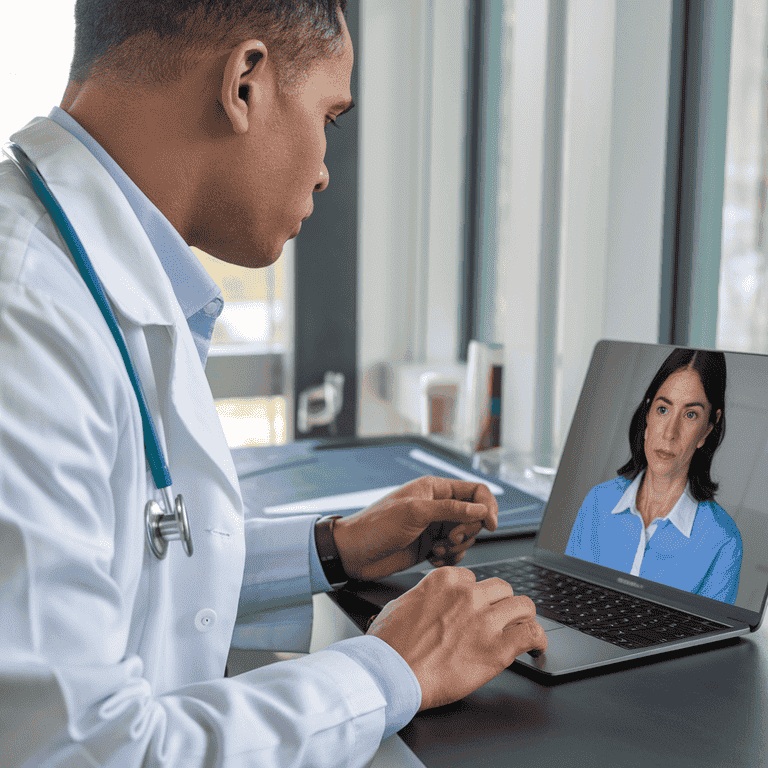Insights for Advanced Practice Providers
In 2024, the healthcare landscape continues to evolve, and the demand for collaborating physicians across various specialties is at an all-time high. For Advanced Practice Providers (APPs), including nurse practitioners and physician assistants, choosing the right collaborating physician is essential to enhancing the scope of practice, improving patient outcomes, and staying competitive in the healthcare market.

This 15-step checklist is designed to help APPs understand which specialties are in demand and how collaborating with physicians in these areas can benefit their practice. Whether you’re working in primary care or a specialized medical field, this checklist will guide you in aligning with the best-collaborating physician for your needs.
Table of Contents
- Family Medicine
- Internal Medicine
- Psychiatry
- Emergency Medicine
- Geriatrics
- Pediatrics
- Obstetrics and Gynecology (OB/GYN)
- Cardiology
- Dermatology
- Neurology
- Endocrinology
- Rheumatology
- Oncology
- Pulmonology
- Nephrology
The 15 Steps
Family Medicine
Family medicine physicians are key collaborators due to their broad focus on preventive care and chronic disease management across all age groups. APPs can offer comprehensive primary care by collaborating with family medicine physicians, especially in underserved areas where they can fill the gap for wide-ranging care.
Internal Medicine
Internal medicine focuses on adult patients and complex diseases like diabetes, hypertension, and heart disease. By collaborating with internists, APPs gain valuable insights into managing chronic conditions, making this a high-demand specialty for partnerships in outpatient and hospital settings.
Psychiatry
The ongoing mental health crisis continues to increase demand for psychiatric services. APPs who collaborate with psychiatrists are better positioned to offer behavioral health services, from managing depression and anxiety to addressing substance abuse issues. This collaboration is essential as mental health services expand across the healthcare system.
Emergency Medicine
With the growth of urgent care centers and telemedicine, emergency medicine remains a fast-paced and critical specialty for APPs to partner with. Collaborating with emergency medicine physicians allows APPs to manage acute conditions in real time, often improving patient outcomes through timely interventions.
Geriatrics
As the population ages, geriatrics is becoming an increasingly important specialty. Geriatricians specialize in caring for elderly patients with complex, multi-system health issues. Collaborating with a senior physician allows APPs to better manage the unique challenges of older adults, including polypharmacy, cognitive decline, and mobility concerns.
Pediatrics
Pediatrics focuses on caring for infants, children, and adolescents, offering various services from preventive care to acute illness management. APPs can enhance their practice by collaborating with pediatricians, especially in family-focused healthcare settings. This collaboration provides APPs with the necessary support to handle everything from routine checkups to serious childhood illnesses.
Obstetrics and Gynecology (OB/GYN)
Women’s health is always in demand, with a focus on reproductive care, prenatal services, and family planning. APPs collaborating with OB/GYNs can provide critical services to women, enhancing access to care in areas such as reproductive health, pregnancy, and preventive screenings.

Cardiology
Heart disease continues to be the leading cause of death worldwide, which makes cardiology a crucial specialty for collaboration. APPs working with cardiologists can provide preventive care, manage chronic conditions like hypertension, and educate patients on lifestyle changes to improve heart health.Dermatology
Dermatology is a growing field driven by medical needs like skin cancer screenings and cosmetic treatments such as Botox and fillers. APPs can expand their practice by collaborating with dermatologists, allowing them to offer specialized care for conditions ranging from acne to psoriasis and elective cosmetic procedures.Neurology
Neurology is becoming increasingly important due to the rise in neurodegenerative diseases like Alzheimer’s and Parkinson’s, as well as the growing need for stroke care. Collaborating with neurologists allows APPs to offer advanced care to patients with neurological conditions, improving outcomes through early diagnosis and intervention.Endocrinology
Endocrinologists specialize in hormone-related disorders such as diabetes, thyroid issues, and metabolic syndromes. As rates of diabetes and obesity rise, collaborating with an endocrinologist provides APPs with the expertise to manage these chronic conditions effectively and improve patients’ quality of life.Rheumatology
Rheumatology is another specialty with an increasing prevalence of autoimmune diseases such as rheumatoid arthritis and lupus. By collaborating with a rheumatologist, APPs can help manage these chronic conditions, offering patients relief through medication and lifestyle management.Oncology
With advancements in cancer treatment and early detection, oncology remains a crucial specialty. APPs collaborating with oncologists can assist in providing comprehensive cancer care, from diagnosis to treatment and survivorship. As cancer care becomes more patient-centered, APPs play an increasingly vital role in supporting patients throughout their journey.Pulmonology
Pulmonology is in high demand due to rising cases of chronic respiratory diseases such as COPD and asthma, along with the long-term effects of COVID-19. Collaborating with pulmonologists allows APPs to manage these respiratory conditions better, ensuring patients receive timely care and appropriate interventions.Nephrology
The prevalence of chronic kidney disease, diabetes, and hypertension continues to grow, making nephrology an essential specialty. Collaborating with nephrologists allows APPs to provide better care for patients at risk for or suffering from kidney disease, including those undergoing dialysis or managing complex fluid and electrolyte imbalances.
Breaking It Down
Choosing the right collaborating physician from these top 15 specialties can significantly impact your practice as an Advanced Practice Provider in 2024. By partnering with physicians in high-demand areas, APPs can expand their expertise, improve patient care, and meet the growing market demand in these specialties. Feel free to reach out if you need more personalized advice or support in finding the best-collaborating physician.

Frequently Asked Questions
How do I determine which specialty is suitable for my practice?
To determine the most suitable specialty for your practice, consider your patient demographic, the types of conditions you most often treat, and your long-term goals. Evaluating your strengths and areas of interest can also help you choose the right collaborating physician from the specialties outlined in the checklist.
Why is collaborating with a physician critical for Advanced Practice Providers (APPs)?
Collaboration with a physician is essential for APPs because it expands the care you can provide your patients. It allows you to access specialized knowledge and improve patient outcomes with expert guidance for complex or high-risk cases. In many states, it’s also a legal requirement for certain types of care.
What are the main advantages of collaborating with specialists in high-demand fields?
Collaborating with specialists in high-demand fields such as cardiology or neurology can help you remain competitive in your practice. These fields often have high patient volumes, and the demand for these services is increasing. Collaborating with specialists also enhances your expertise in treating complex conditions and improves the overall quality of care.
How does collaboration impact patient care in underserved areas?
In underserved areas, collaboration can have a profound impact by increasing access to specialized care. Physicians from high-demand specialties may not always be present in these areas, and by collaborating with them, APPs can fill the gap, offering patients much-needed medical services that otherwise may be unavailable.
Can collaborating with multiple physicians in different specialties be beneficial?
Yes, collaborating with multiple physicians across various specialties can broaden your care range. It allows you to address numerous patient needs, from acute conditions to chronic disease management. This can enhance your versatility as an APP and make your practice more comprehensive.
Is there a particular specialty that offers more flexibility for APPs?
Family and internal medicine offer the most flexibility for APPs because these specialties cover a broad spectrum of patient care. They allow you to manage acute and chronic conditions across diverse populations, providing a wide range of opportunities for collaboration.
How can I ensure that my collaboration with a physician remains effective over time?
Maintaining clear communication, regularly discussing patient care strategies, and staying updated on medical advancements in your collaborative specialty are critical to an effective, long-term partnership. Setting clear expectations and goals at the start of your collaboration helps prevent misunderstandings and ensure alignment.
Do specific specialties offer more opportunities for career growth as an APP?
Specialties like cardiology, oncology, and neurology often offer more opportunities for growth due to their high demand and the complexity of care involved. By gaining experience and collaborating with experts in these fields, you can further develop your skills and take on leadership roles in specialized areas of healthcare.
How does collaborating with a specialist improve patient outcomes?
Collaborating with specialists improves patient outcomes by ensuring patients receive expert care in managing specific conditions. For example, working with a cardiologist can enhance the management of heart disease, while collaboration with a psychiatrist can improve outcomes in mental health cases. Specialists bring a depth of knowledge that complements the broad skill set of an APP, leading to better diagnosis, treatment plans, and patient follow-up.
What are the challenges associated with finding the right collaborating physician?
Challenges include finding a physician who shares your practice philosophy, operates in a complementary specialty, and is open to collaborative work. Additionally, legal requirements in some states may dictate how collaborations are structured, which can complicate the process. Finding a partner whose skills align with your practice needs and who is committed to effective communication is essential.
How can I navigate legal or regulatory requirements when seeking a collaborating physician?
Being familiar with state laws and regulations regarding physician collaboration for APPs is essential, as these vary by state. Consulting legal or professional advisors and joining professional organizations can help you meet these requirements while setting up a successful collaborative arrangement.
What should I look for in a potential collaborating physician beyond their specialty?
Beyond their specialty, consider the physician’s communication style, willingness to mentor, and commitment to collaboration. It’s also crucial to evaluate their experience with APPs and whether they are receptive to a team-based approach to patient care. A strong working relationship built on mutual respect is vital to a successful collaboration.
How do I initiate collaboration with a physician?
Begin by networking within your professional community, attending industry events, and reaching out to potential collaborators through referrals or professional organizations. Once you’ve identified a potential partner, arrange a meeting to discuss goals, expectations, and how the collaboration would benefit both parties. Establishing clear communication and shared objectives from the outset is essential.
Can collaboration with specialists open up new service offerings in my practice?
Yes, collaborating with specialists can enable you to introduce new services, such as specialized diagnostic procedures, advanced treatment plans, or chronic care management programs. Expanding your range of services can diversify your practice, attract more patients, and increase revenue.
What impact does telemedicine have on collaborations between APPs and physicians?
Telemedicine has made it easier for APPs to collaborate with physicians, especially in remote or underserved areas. It allows APPs to access specialist advice and consults in real-time without needing in-person visits. This flexibility can enhance care delivery, especially in specialties like psychiatry, emergency medicine, and geriatrics.
How should I approach conflicts or challenges in collaboration with a physician?
When conflicts arise, the best approach is to address issues directly through open and respectful communication. Discuss the challenges, identify the root cause, and work together to find a resolution. If necessary, involve a mediator or legal professional to help resolve any severe disputes.
Additional Resources for You
American Academy of Nurse Practitioners (AANP)
The AANP is the largest professional membership organization for nurse practitioners in the U.S. It provides advocacy, education, and professional development resources.
Visit AANP
American Academy of Physician Assistants (AAPA)
The AAPA is a professional organization that supports PAs with resources for career development, continuing education, and advocacy in the healthcare industry.
Visit AAPA
American College of Cardiology (ACC)
The ACC is a leading resource for cardiologists and healthcare providers collaborating in cardiovascular care. It offers educational programs, clinical guidelines, and patient care resources.
Visit ACC
American Psychiatric Association (APA)
The APA supports professionals in the field of psychiatry, offering educational resources, advocacy, and clinical practice guidelines. It is a useful resource for APPs collaborating with psychiatrists.
Visit APA
American College of Obstetricians and Gynecologists (ACOG)
ACOG is a professional organization providing resources and guidelines for OB/GYNs and healthcare providers in women’s health, including APPs working in this specialty.
Visit ACOG
American Geriatrics Society (AGS)
The AGS provides resources and support for healthcare providers working with elderly populations. It offers clinical guidelines, educational tools, and advocacy for geriatric care.
Visit AGS
National Organization of Nurse Practitioner Faculties (NONPF)
The NONPF is dedicated to promoting high-quality nurse practitioner education. It offers resources for educators and practitioners to advance their professional skills.
Visit NONPF

What Next?
If you’re an Advanced Practice Provider seeking a Collaborating Physician or Medical Director to enhance your med spa or IV hydration practice or a Physician ready to share your expertise and partner with dedicated APPs, now is the perfect time to take the next step. Join a community that connects healthcare professionals like you with the right collaboration opportunities. Register for free today at Doctors4Providers and unlock the potential of working together to provide top-quality care to patients. Don’t miss this opportunity to grow your practice or expand your impact as a physician—register now!

